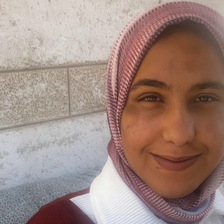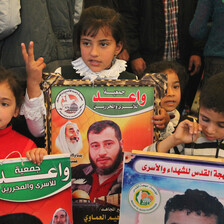The Electronic Intifada 15 April 2025

Reem’s husband, Namar, and their five children in happier times.
When the recent ceasefire allowed me to visit my heavily damaged neighborhood of al-Zeitoun in Gaza City, I caught up with my neighbor, Reem Awda.
At the time, Reem, 30, was cleaning her home.
She was, I guess, relatively lucky, compared to so many others.
While the three-story building had been struck by what the family assumes was an artillery shell early in Israel’s genocidal aggression that took out the living room wall, the structure remained intact.
And when the Israeli military invaded the area the first time, in December 2023, soldiers – whose shelling killed my mother while we tried to escape that advance – used Reem’s home as a base.
That day in late January, Reem told me about the Israeli forces storming the neighborhood, about her husband’s arrest and about the ordeals she went through.
She said that when Israeli troops invaded the neighborhood she, her husband, Namar, 39, and their five children, 4 - 13, found themselves trapped inside their home. The relentless shelling made any attempt to escape impossible.
Huddled together they braced for the worst, knowing that death could come at any moment.
Then a shell struck their living room.
Escape
“The explosion plunged the house into darkness and filled the air with dust,” Reem said. She recalled coughing, feeling disoriented and shouting for Namar and the children.The sound of their voices reassured her that they were alive.
As the bombardment subsided, Namar saw a chance for the family to leave.
“He refused to stay any longer,” Reem said. “He believed it might be our only opportunity for survival.”
They stepped outside but Israeli tanks were already surrounding the area.
With no safe way out of the neighborhood, Reem and her family sought refuge in the house of Namar’s uncle just a few streets away.
Reem said they felt “safer” there – not because the danger had passed but because they were no longer isolated. The house, surrounded by many others and tucked into a narrow alley, seemed less likely to be struck by artillery.
For three days, the two families remained under siege, completely cut off from the outside world. “We had no food or water,” Reem recalled. “Outside, we could hear Israeli soldiers laughing, speaking casually and firing bullets through the streets.”
Silence became a matter of survival. They kept their hands over the children’s mouths at times, terrified that even the smallest sound could give them away.
On the fourth day of the invasion, Israeli soldiers announced over loudspeakers that “if anyone is still hiding, you must surrender, or we will destroy your homes over your heads.”
Reem said that they were too afraid and stayed hidden until an Israeli bulldozer began tearing through the first floor, causing it to shake violently. With no other choice, the two families surrendered.
As they stepped out of the house, Reem said they were shocked to find they were not alone. Many others, probably about 100 people, from the neighborhood had already surrendered.
Reem said the Israeli soldiers were shouting in broken English, trying to divide them into groups and ordering them to throw their belongings on the ground for inspection.
Stripped and beaten
The men were forced to strip and beaten mercilessly, Reem remembered.
“They made us watch,” she said. Rashad, her 6-year-old son, could not bear seeing his father being beaten. He tried to shield him, but one of the soldiers pushed him to the ground, Reem said.
Handcuffed and blindfolded, the men were then taken to Reem’s home, which was serving as a base for the soldiers.
The women and children were forced to stand outside for hours. They feared that the soldiers had killed all the men. But some hours later, a soldier came out and called for Reem to follow him.
She found her husband along with other men on the ground blindfolded, hands cuffed tightly. Reem said she couldn’t hold back the tears when she saw her husband. Namar tried to reassure her.
“Do not be afraid,” he said. “They just want to ask you a few questions.”
Reem said that a soldier interrogated her for hours, demanding to know why they hadn’t evacuated. She explained to him several times that the invasion had come without warning. After that, the soldier ordered her to go outside.
Once the other women saw Reem, they desperately asked her if she had seen their sons and husbands, but before she could respond she was forced to sit on the ground with the other women while the men were grabbed one by one and made to lie face down.
A tank soon rumbled toward the men. For a moment, Reem thought the tank was going to crush them. Some of her fellow captives screamed in terror. But the tank stopped, apparently playing some game of psychological torment.
Soon, a truck arrived to take the men away. Women and children screamed for their husbands and fathers, but to no avail.
Forced to move
Once the men had been taken away, the women and children were ordered to leave and head south. Again left with no choice, some 30 women and children left barefoot, walking on shattered glass, rubble and stones, without any of their belongings.
Reem said her youngest children, Misk and Mohamed, 4, could not walk because they hadn’t eaten for two days and she had to carry them.
While the other women went south, Reem chose a different path, however, hoping to find safety and shelter in the north. Eventually, she reached a United Nations shelter.
Left to care for her children alone, Reem’s life became a constant struggle. She was also haunted by the uncertainty of Namar’s fate. She tried to contact the Red Cross in January 2024, but for months, there was no news. It wasn’t until a neighbor was released from prison that she finally learned her husband was alive and being held in the notorious Ofer prison.
“My husband is a good man who always puts his family first. He loves his children deeply and ensures they are always at the top of their studies, working tirelessly to provide them with everything they need,” Reem said in January.
I left Reem still cleaning a home that had also been burned out, she said deliberately, when Israel’s soldiers left.
There was no furniture left, though Reem had managed to secure a rug, a few kitchen utensils and some mattresses for her and her children.
The house felt haunted. And while standing, some walls are on the verge of collapsing.
But this is all Reem and her children have left. And every day, they check to see if there is any news of Namar.
So far, nothing.
Shahad Ali is a writer in Gaza.





